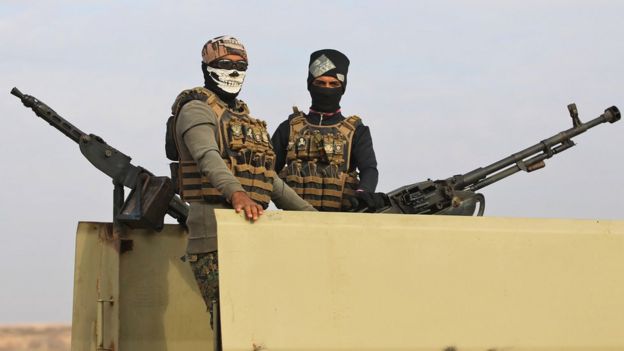
This article is more than
6 year old
Staff at the embassy in Baghdad and the consulate in Irbil must leave as soon as possible on commercial transport.
Germany has meanwhile suspended its training of soldiers in Iraq.
The US military said on Tuesday that the threat level in the Middle East had been raised in response to intelligence about Iran-backed forces in the region.
It contradicted a British general who had said there was no increased threat.
Chris Ghika, deputy commander of the global coalition against the Islamic State group, told reporters that measures in place to protect US forces and their allies from Iran-backed militias in Iraq and Syria were "completely satisfactory".
"We are aware of their presence clearly and we monitor them along with a whole range of others because that is the environment we are in," he added.
But a spokesman for the US military's Central Command later disputed Gen Ghika's comments, saying they ran "counter" to the credible threats identified by US and allied intelligence agencies.
Central Command, in co-ordination with the global coalition's Operation Inherent Resolve (OIR), had "increased the force posture level for all service members assigned to OIR in Iraq and Syria", Capt Bill Urban said in a statement.
"As a result OIR is now at a high level of alert as we continue to closely monitor credible and possibly imminent threats to US forces in Iraq," he added.
Germany's defence ministry said on Wednesday that the German army had suspended its training programmes in Iraq. A spokesman said there was "generally heightened alert, awareness" for the 160 troops involved in the operation.

Earlier, Reuters news agency cited Iraqi security sources as saying that during a visit to Iraq earlier this month US Secretary of State Mike Pompeo had told Iraqi commanders that intelligence showed Iran-backed paramilitary fighters were positioning rockets near bases housing US troops.
"The message from the Americans was clear. They wanted guarantees that Iraq would stop those groups threatening US interests," one of the sources was quoted as saying. "They said if the US were attacked on Iraqi soil, it would take action to defend itself without co-ordinating with Baghdad."
Iraq's Prime Minister, Adel Abdul Mahdi, said on Tuesday that its security forces had not observed "movements that constitute a threat to any side".
Paramilitary groups trained, armed and advised by Iran have played an important role in the battle against IS in Iraq. They were formally incorporated into the Iraqi security forces last year, but continue to operate semi-independently.
Spokesmen for two of the groups told Reuters that the talk of threats to US forces was "psychological warfare" by Washington.
The US does not have a diplomatic presence in Iran. The Swiss embassy represents US interests in the country.
It was also reported on Tuesday that US investigators believed Iran or groups its supported had used explosives to damage four tankers off the coast of the United Arab Emirates on Sunday. Large holes were found in the hulls of the tankers, but no evidence has been released showing a link to Iran.
Earlier this month, the US sent an aircraft carrier and B-52 bombers to the Gulf.
There were repeated warnings from Washington justifying the military build-up, based on what Mr Pompeo described as an "escalation" in activities by Iran.
It came after the US ended exemptions from sanctions for importers of Iranian oil.
President Donald Trump reinstated the sanctions last year after abandoning a landmark nuclear deal between Iran and six world powers.
Iran has vowed to overcome the measures, but its economy is sliding towards a deep recession and the value of its currency has plummeted.